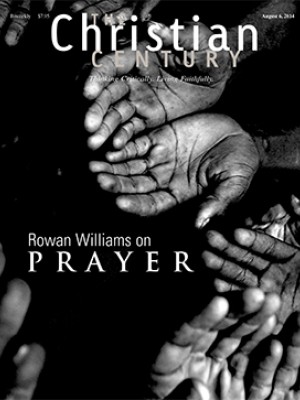Sunday, August 17, 2014: Genesis 45:1-15; Matthew 15:21-28
Joseph knows what he is seeing. His brothers do not.
My wife, our four sons, and I occasionally take family trips into Washington, D.C. We always go in uniform: everyone wears the same T-shirt. We like the visibility of bright orange, and our current uniform is a loud orange advertisement for the West Michigan White Caps, the minor league baseball team in Grand Rapids. This choice sometimes has the effect of helping Michiganders feel at home on the East Coast, though it deflates them somewhat to realize we are from West Virginia.
One day at the National Gallery of Art, we confirmed the lesson of uniforms. As we strolled through the galleries we suddenly realized we were one boy short. We called for him, heard giggles, and then started the search in earnest. The boys found it endlessly entertaining to watch their parents circle around and around the galleries looking for their hiding son.
Read our latest issue or browse back issues.
After our third lap a kind woman, who obviously had experience with children, quietly told us that our son was hiding in the fern behind the Degas. At least he had good taste in hiding places! “I know he is yours because he has the same shirt,” the woman said. “What a good idea.” After a few more moments we reclaimed our giggling, orange-shirt-wearing son from behind the enormous fern. His day was made, our blood pressure headed back toward normal, and the others agreed that the experience had been “so cool!”
The woman who spotted our son knew what she was seeing. A boy in an orange shirt giggling behind a fern; wide-eyed, head-swiveling adults in orange shirts dragging other orange-shirted boys in circles—it all added up to the kind of mystery she could end happily. It is the lesson of the Old Testament and Gospel readings for this week: it makes all the difference to know what you are seeing.
Joseph stands before his brothers as lord of all of Egypt. He is surrounded by all of the glory of one of the mightiest empires of the ancient world. Because of Joseph, there is grain in Egypt. Because of Joseph, Egypt will persevere. Because of Joseph, Pharaoh will even profit from the disaster. Joseph must be an imposing sight, and his brothers are not particularly happy to be there. They’ve found themselves between a rock and a hard place; nothing is going well for them. Joseph knows what he is seeing. His brothers do not.
Genesis 45 opens with Joseph’s inability to carry on the charade. He clears the room and begins to cry. Years of pain, grief, and suffering flood from his soul. Joseph calls his brothers to him, and they are slow to come. As in today’s world, there are physical and emotional barriers between the hungry and the high political officials. There are bars and benches, even impact-resistant glass. Nevertheless, Joseph gathers his brothers and explains the situation to them. He tells them what he sees: “I am your brother Joseph, whom you sold into Egypt. And now do not be distressed, or angry with yourselves, because you sold me here; for God sent me before you to preserve life.”
This week’s text from Matthew takes us from the glory of government palaces in Egypt to the dusty and ignominious byways of Tyre and Sidon. Although Hiram and his contributions to Jerusalem and the temple are fondly remembered by the biblical authors, the prophets were not particularly pleased with either the faith or the politics of Tyre and Sidon. That Jezebel was a Sidonian says it all.
Jesus is in this region on retreat. He’s just done a tremendous amount of ministry, which anyone with a passing knowledge of ministry knows can be exhausting. Jesus, knowing that he requires the help of the Spirit, goes from the crowds in order to pray. The point of being this far from home is that no one will know who they are seeing.
Yet there is one woman who sees. Matthew goes out of his way to let us know that she is on the outside: “Behold, a Canaanite woman.” A woman at a men’s retreat is jarring. An insistent and loud woman at a men’s retreat is irksome. The presence of an unrelenting, howling woman from among the idolaters is more than can be borne. Yet Jesus is silent.
Finally, the disciples beg Jesus to do something. We all know how bothersome it is to be in the prayer closet and to be interrupted by the urgent. Few of us have the spiritual fortitude to pray through it undistracted. The disciples just want it to stop.
So Jesus attempts to send the woman away. But she persists, because she sees who he really is. Finally, Jesus points out the obvious: she is outside the covenant. But she sees clearly that it is the Lord she addresses. He has the power, and his blessings shall overflow and cover the whole world. She sees that Jesus has been sent by God to preserve life. Great is her faith.
When we go off into the world, it is important to know what we are looking for—and what we are seeing.






